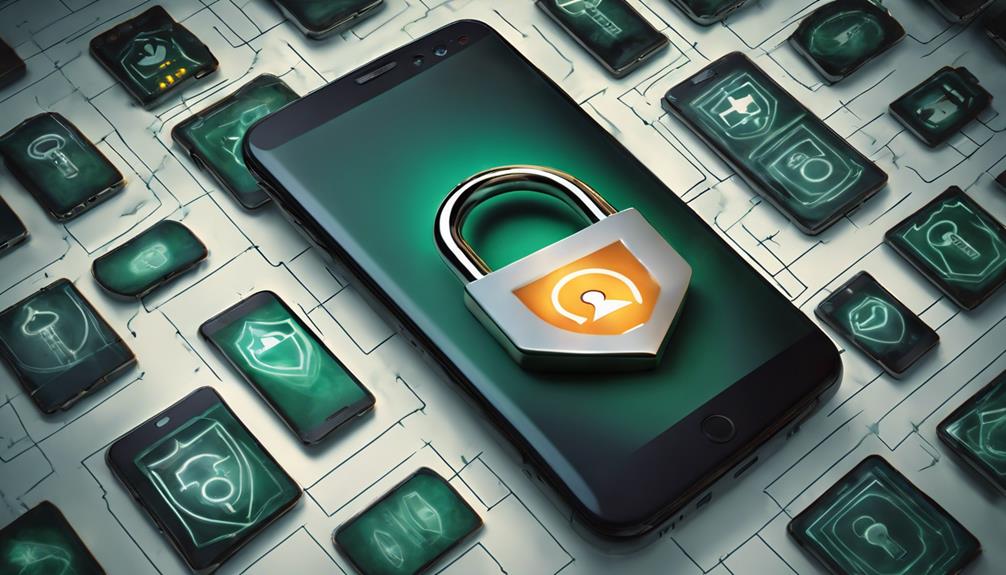WhatsApp is safe from hackers due to its robust security features. End-to-end encryption protects messages, calls, and photos, ensuring only the sender and recipient can access them. Two-step verification adds an extra layer of security, making it challenging for hackers to breach accounts. Strong passwords and vigilance against phishing are vital in safeguarding personal information. Updating WhatsApp regularly is essential to stay protected from evolving threats. Implementing recommended security measures like two-factor authentication enhances overall account security. Stay cautious of suspicious activity and enable two-step verification for added protection against potential hacking attempts. Understanding these measures is essential for maintaining a secure WhatsApp experience.
Key Takeaways
- End-to-end encryption safeguards messages from hackers.
- Two-step verification adds extra security layer against hacking attempts.
- Strong passwords deter unauthorized access by hackers.
- Regular updates ensure protection against known security risks.
- Stay vigilant against phishing scams to safeguard WhatsApp from hackers.
WhatsApp Security Measures
When considering WhatsApp security measures, it is crucial to acknowledge the significant role of end-to-end encryption in safeguarding messages, calls, and photos from potential hackers. This advanced encryption technology guarantees that only the sender and the recipient can access the content, making it nearly impossible for cybercriminals to intercept or decipher the information being shared.
Additionally, enabling two-step verification adds an extra layer of security by requiring a unique code in addition to the password when logging into an account, further reducing the risk of unauthorized access.
Potential Hacking Threats

Considering the importance of safeguarding WhatsApp accounts, it is essential to address the various potential hacking threats that users may encounter.
Hackers often exploit weak passwords as an entry point to gain unauthorized access to WhatsApp accounts. Utilizing strong, complex passwords is vital in deterring such malicious attempts.
Additionally, phishing scams pose a significant risk, where hackers trick users into revealing their login credentials through deceptive means. To enhance security, users are advised to enable two-step verification, which provides an extra layer of protection against unauthorized access.
This feature requires a secondary code or authentication method besides the password, making it more challenging for hackers to breach the account.
Enhancing WhatsApp Security

To enhance the security of your WhatsApp account, it is essential to proactively implement recommended security measures. Here are three vital steps to strengthen the privacy and security of your account:
- Enable Two-Step Verification: By enabling two-step verification, you add an extra layer of protection to your account. This feature requires a PIN that you set, in addition to the verification code sent via SMS when verifying your phone number with WhatsApp.
- Use Strong Passwords: Utilize strong, unique passwords for your WhatsApp account to prevent unauthorized access. Avoid using easily guessable passwords and consider using a password manager to generate and store complex passwords securely.
- Stay Cautious of Phishing Attempts: Be vigilant against phishing attacks by refraining from clicking on suspicious links sent via messages. Verify the authenticity of messages and links before interacting with them to safeguard your account from potential threats.
Two-Factor Authentication Importance

Two-factor authentication plays a vital role in bolstering WhatsApp security measures. By requiring a second verification step, it acts as a barrier against unauthorized access to your account, especially in the event of a compromised password.
This additional layer of protection is instrumental in preventing potential breaches and enhancing the overall security of your personal information.
Two-Factor Authentication Benefits
Enhancing security measures through the implementation of two-factor authentication is paramount in safeguarding sensitive data and preventing unauthorized access to online accounts. Two-factor authentication offers numerous benefits that greatly enhance privacy and mitigate security risks.
- Added Layer of Security: By requiring a second form of verification, such as a code sent to your phone or a biometric scan, two-factor authentication adds an extra barrier that prevents unauthorized access, even if a hacker obtains your password.
- Reduced Risk of Hacking: Two-factor authentication plays an essential role in protecting sensitive information by significantly decreasing the risk of hacking attempts. This extra layer of security acts as a deterrent to cybercriminals looking to exploit vulnerabilities.
- Enhanced User Security: Many online platforms and services offer two-factor authentication options to their users, aiming to enhance overall security and provide peace of mind to individuals concerned about the safety of their accounts.
Enhancing Account Security
Implementing two-factor authentication is an essential step in fortifying the security of your online accounts, including your WhatsApp account. By using the WhatsApp two-factor authentication feature, you add an extra layer of protection to your account.
This security measure requires a secondary verification method, usually a unique code sent to your phone number, to guarantee that only you can access your account, even if your password is compromised.
Given that WhatsApp is end-to-end encrypted, enabling two-factor authentication becomes even more crucial in safeguarding your personal information from potential hacking attempts. It is a proactive step that can greatly reduce the risk of unauthorized access to your account and enhance overall security.
Therefore, taking advantage of two-factor authentication is highly recommended for all WhatsApp users who prioritize the safety and privacy of their account and communications.
Preventing Unauthorized Access
Securing your WhatsApp account against unauthorized access is paramount in protecting your personal information and maintaining privacy. Two-factor authentication plays a vital role in enhancing account security by adding an extra layer of protection.
Here are three reasons why two-factor authentication is essential in preventing unauthorized access:
- Enhanced Security: Two-factor authentication requires not only your password but also a verification code, greatly reducing the risk of unauthorized access even if your password is compromised.
- Prevention of Hacking Attempts: By enabling two-factor authentication, you create a barrier that makes it harder for hackers to gain access to your account, safeguarding your personal information and conversations.
- Recommended Security Measure: It is highly recommended to set up two-factor authentication to bolster the security of your WhatsApp account against potential hacking attempts.
This security feature is essential in maintaining the confidentiality of your data and ensuring peace of mind regarding unauthorized access.
Recognizing Suspicious Activity

When using WhatsApp, it is important to remain vigilant in recognizing any suspicious activity that may signal a potential security threat. Monitoring notifications for new logins, unfamiliar profile changes, or unexpected messages is essential to detect unauthorized access.
Password change alerts or unusual verification code requests should raise red flags as they could indicate a security breach. Additionally, avoiding sharing registration codes and refraining from clicking on dubious links can help protect against phishing attacks that aim to compromise your account.
To enhance security, users should leverage WhatsApp settings to enable two-step verification. This feature adds an extra layer of protection, making it more challenging for hackers to gain unauthorized entry.
Updating WhatsApp for Protection

To fortify the security of your WhatsApp account, ensuring regular updates is essential in safeguarding against potential vulnerabilities and enhancing protection from hacking threats.
When it comes to updating WhatsApp for protection, consider the following:
- Stay Updated: Regularly updating your WhatsApp ensures you have the latest security patches and protection against vulnerabilities. New updates often include security enhancements to safeguard your account from potential hacking attempts.
- Maintain Integrity: Keeping your app up to date is important for maintaining the integrity and security of your messages and data. Outdated versions of WhatsApp may expose you to known security risks exploited by hackers.
- Mitigate Threats: Regular updates help mitigate security threats and ensure a safer messaging experience on WhatsApp. By staying current with updates, you can proactively protect your account from potential vulnerabilities and hacking risks, making your WhatsApp usage more secure and reliable.
Safeguarding Personal Information Online

Enhancing the protection of personal information online is paramount in today's digital landscape. Safeguarding WhatsApp privacy is crucial to protect users from potential threats. Hackers often attempt to install malware on users' devices through various means, including phishing messages or malicious links. To fortify your personal information security, it is essential to follow best practices such as enabling two-step verification on WhatsApp. This additional security layer can thwart hacking attempts and prevent unauthorized access to your account. Avoid sharing sensitive information like passwords or verification codes to mitigate the risk of falling victim to cyber attacks. Regularly updating your WhatsApp application is also vital as it ensures you have the latest security features and patches to defend against potential vulnerabilities. By using strong, unique passwords and staying vigilant against suspicious messages, you can significantly reduce the likelihood of hackers compromising your personal information.
| Best Practices for Protecting Personal Information Online | |||
|---|---|---|---|
| Enable two-step verification on WhatsApp to add extra security | Avoid sharing sensitive information to prevent hacking | Regularly update WhatsApp for the latest security features | Use strong, unique passwords for enhanced protection |
Vigilance Against Hacking Attempts

To enhance your security on WhatsApp, make sure to enable two-step verification as an essential security measure.
Additionally, it's important to stay vigilant and recognize potential phishing attempts that hackers might use to gain access to your account.
Security Measures for WhatsApp
Implementing robust security measures is essential to safeguarding your WhatsApp account against potential hacking attempts.
To enhance the security of your account, consider the following steps:
- Enable Two-Step Verification:
By enabling two-step verification on your WhatsApp account, you add an extra layer of protection that requires a unique code in addition to your password for access.
- Regular Account Monitoring:
Stay vigilant by regularly checking your account for any unusual activity, such as unrecognized logins or new contacts added without your knowledge. Promptly report any suspicious behavior to WhatsApp.
- Avoid Sharing Sensitive Information:
Protect your account by refraining from sharing personal information or verification codes with unfamiliar or untrusted sources. Be cautious of requests for sensitive details that could compromise your account's security.
Recognizing Phishing Attempts
Maintaining a high level of vigilance against potential phishing attempts is essential in safeguarding your WhatsApp account from hacking threats. Hackers often utilize phishing attempts, which involve deceptive tactics to acquire personal information or login credentials. Being cautious of unsolicited messages requesting personal information or verification codes is crucial, as these could be phishing attempts aimed at compromising your account security. Look out for signs of impersonation, such as fake logos or email addresses, to avoid falling victim to phishing scams. Additionally, refrain from clicking on suspicious links or attachments in messages, as they may contain malware designed to hack into your WhatsApp account. It is advisable to verify the authenticity of any requests for sensitive information by contacting the legitimate source through a verified channel. Educating yourself and others about common phishing tactics can help in recognizing and preventing potential hacking attempts on your WhatsApp account.
| Signs of Phishing Attempts | Description | Prevention Tips |
|---|---|---|
| Unsolicited requests for personal information | Be cautious of messages asking for personal data. | Avoid sharing personal information without verification. |
| Impersonation signs like fake logos | Look for fake logos or email addresses in messages. | Verify the legitimacy of sources before sharing information. |
| Suspicious links or attachments | Avoid clicking on suspicious links or attachments. | Refrain from interacting with unknown or suspicious content. |
Frequently Asked Questions
How Safe Is Whatsapp From Hackers?
WhatsApp's security measures include end-to-end encryption to protect messages. However, the strength of your password and the activation of two-step verification are vital factors in determining the safety of your account from potential hacking threats.
Can You Get Hacked Through Whatsapp?
Traversing the digital landscape can expose vulnerabilities, and Whatsapp is not immune. With vigilant security measures like strong passwords and two-step verification, users can fortify their defenses against potential hacking attempts, ensuring a safer online experience.
Why Would Someone Use Whatsapp Instead of Texting?
WhatsApp offers a versatile platform for communication, allowing users to send messages, make calls, and share media effortlessly. Its popularity stems from its ease of use, group messaging capabilities, international reach, and cost-effectiveness compared to traditional SMS texting.
What Are the Dangers of Using Whatsapp?
The dangers of using WhatsApp include vulnerability to hacking due to weak passwords, phishing scams, unauthorized access leading to data theft, and malware exploits. Employing two-step verification can enhance account security against these risks.
Conclusion
In summary, while WhatsApp has taken steps to enhance security measures, it is important for users to remain vigilant against potential hacking threats.
By implementing two-factor authentication, recognizing suspicious activity, and regularly updating the app, individuals can better safeguard their personal information online.
However, no system is completely immune to hackers, so it is vital to remain cautious and proactive in protecting oneself.
Remember, in the digital age, safety is always a priority, even on seemingly secure platforms like WhatsApp.









